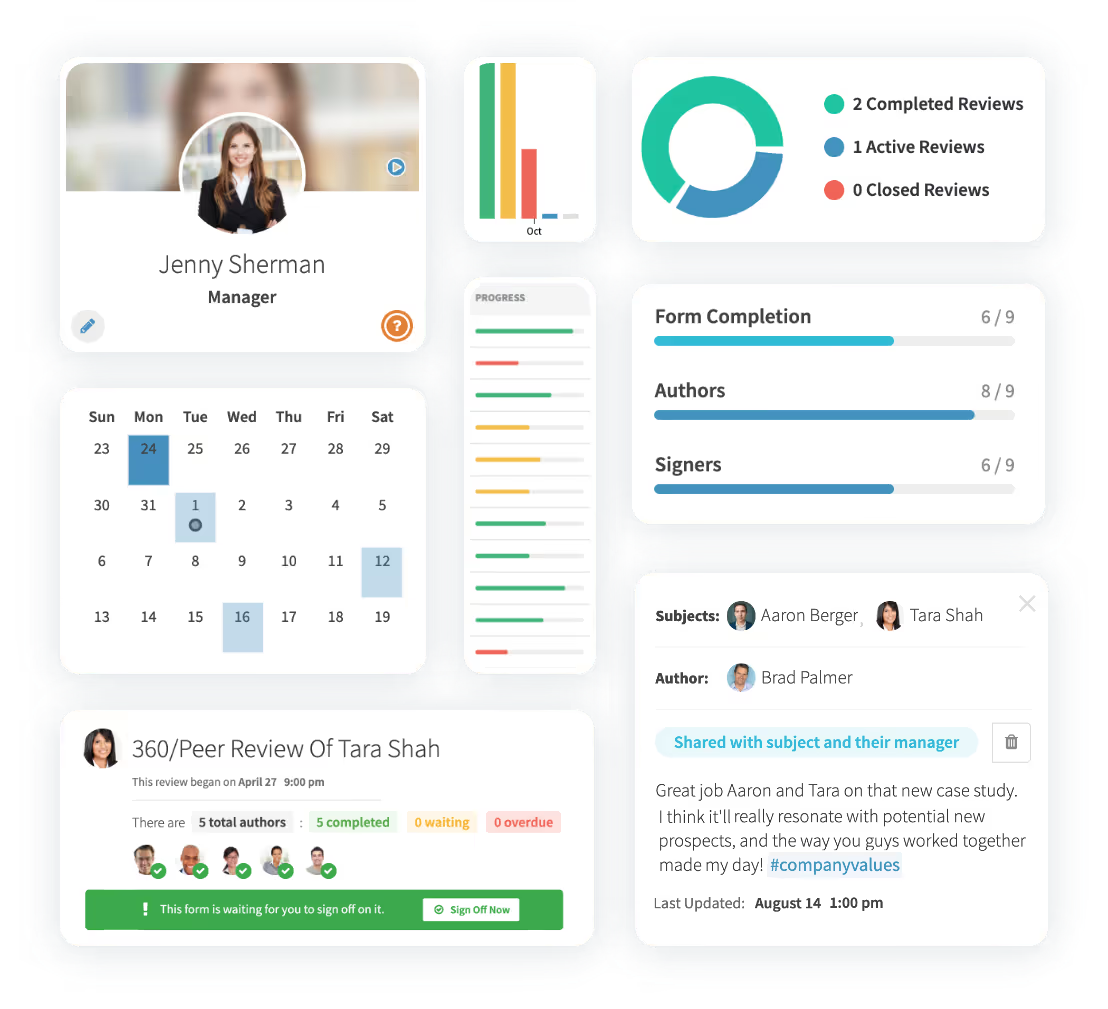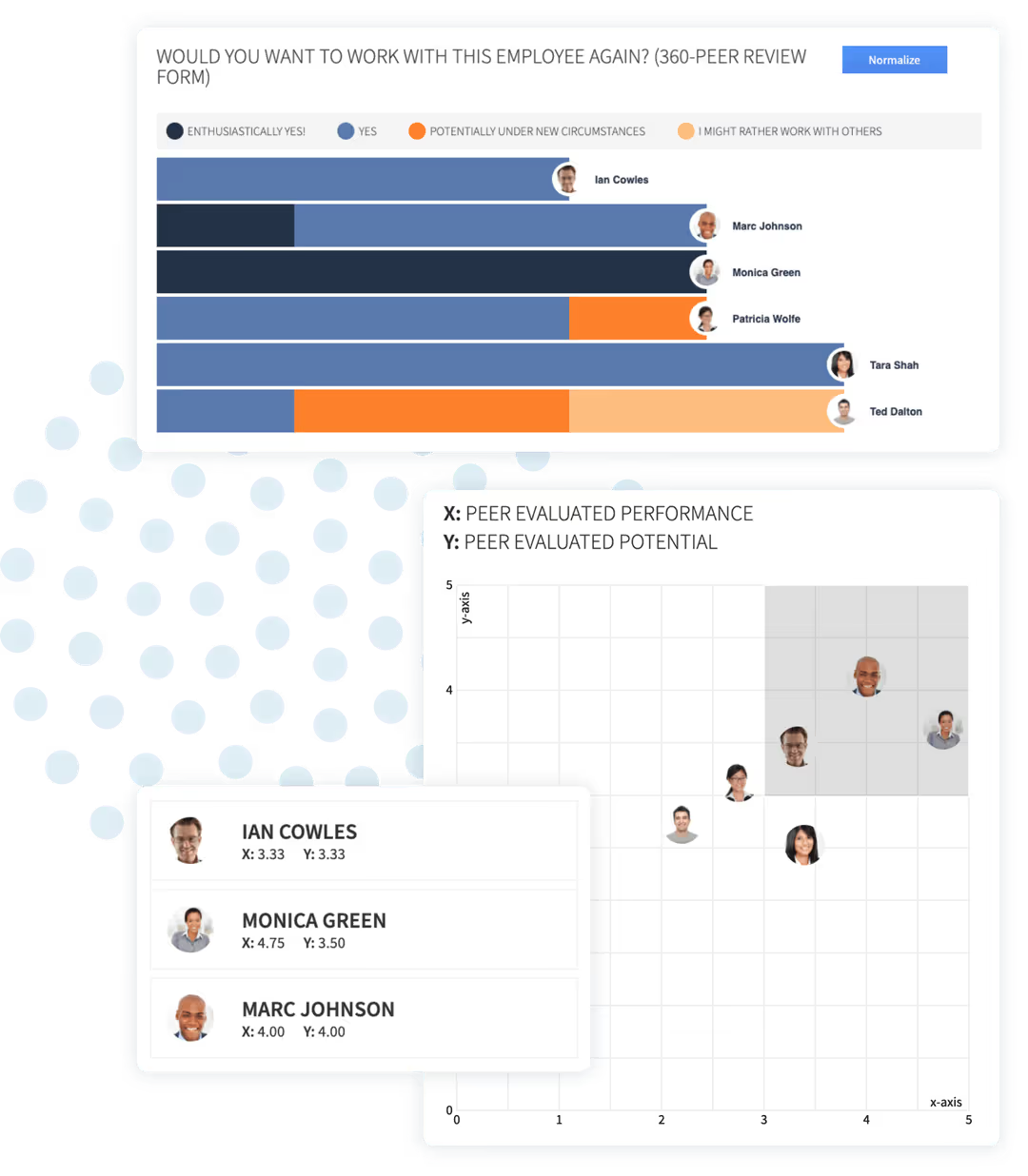4 Things to Know About HRIS Performance Management
If you use a human resources information system (HRIS), you’ve probably thought about using HRIS performance management. After all, it's already keeping track of employee data. Not to mention, it means you can use the software you already have, making it a cheaper solution than purchasing a brand-new program.
We hear these things from organizations that need a performance management system. They want to see what their HRIS performance management system is capable of doing before they sign up for PerformYard.
There’s nothing wrong with taking a deep dive into your HRIS performance management system to see what it’s capable of. That said, don't be surprised if it doesn't fulfill your performance management needs.
This article will reveal why organizations choose a tool like PerformYard over an HRIS add-on. First, let’s show the differences between performance management software and HRIS tools.
What is an HRIS Performance Management Tool?
HRIS systems incorporate information related to new hires, payroll, and employee data management. They’re designed to help you organize the details that make up the people side of your organization.
It sounds like it would lend itself well to performance management. However, that’s only possible if you add a performance management module.
Some of the top HRIS systems offer performance management modules. These modules let you conduct employee reviews, performance evaluations, and assessment planning.
The add-ons aren’t part of the original design of the software. Add-ons must operate within the parameters of the existing system, meaning you won’t get the features you need to customize a performance management system. The modules let you use your existing HRIS system, but they can end up feeling bulky and outdated.
Is Performance Management Software the Same as an HRIS?
Both an HRIS and a tool like PerformYard help organize employee data. However, each application has a different purpose.
HRIS systems act as a repository for employee data like date of hire, compensation, and benefit selections. This information can help employees develop career plans and identify training opportunities.
On the surface, this may sound like a performance management system.
However, an HRIS system is not designed for designing, gathering, and storing review-specific information. That’s what a performance management tool is designed to do.
It is completely dedicated to performance management, whatever that means for your organization.
A specialized system is flexible, so you can customize a review process that is streamlined for HR, management, and employees. It allows you to take a deep dive into goal management and continuous feedback. You can also use reporting options that are specialized for the review process.

A performance management system has a lot more features that are specific to the review process compared to an HRIS tool.
4 Reasons You Shouldn’t Use an HRIS for Performance Management
An HRIS system for performance management is convenient if you already have an HRIS system. That doesn’t mean it is the best solution.
Here’s why HRIS add-ons are not the ideal solution for performance management:
- They lack flexibility
- Your managers and employees will hate it
- HRIS systems aren't designed to offer quality support
- You will likely experience data issues with HRIS performance management modules
1. It lacks flexibility
Great performance management is in the details. You should have the ability to decide what kind of review process is right for your employees and your organization. It’s also important to be able to switch up your approach whenever it’s necessary. Performance management software lets you create meaningful KPIs so everyone is working towards organizational goals.
An HRIS system isn’t designed for the flexibility that high-performance management requires.
Though add-ons are available, they don’t offer the customization you get with a dedicated performance management system. You’ll find that it won’t enable you to customize the process exactly the way you want.
» Using Bamboo Performance Management? Click here to discover the better alternative.
2. Your managers and employees will hate it
There are a lot of people out there who aren't very happy with their jobs. In one report, 60 percent of respondents reported being emotionally detached at work, with many employees reporting feelings of worry, sadness, and anger on the job.
Where are all of these negative emotions coming from?
Things like pay and work-life balance indeed affect how people feel about work, but at the end of the day, it's how they experience their work that matters. If their day is punctuated by the use of ineffective tools that make doing their job more difficult, you can bet that resentments will develop.
Existing HRIS performance management add-ons aren’t designed for employees to collaborate on complex workflows. It is designed with administrators in mind, with employees doing simple tasks like putting in PTO or checking pay stubs. The complex tasks that are required to conduct thorough reviews will frustrate employees.
HRIS systems are rigid and centralized. That makes it difficult for your employees to participate, which makes it a pain for managers to manage. If they all hate the program, you can bet they won't be fully engaged in the process, and an unengaged workforce can have serious consequences for your business.
» Using UKG Performance Management? Click here to discover the better alternative.
3. HRIS systems aren't designed to offer quality support
A dedicated performance management platform comes with expert support. Whether you have a question about how to customize the review process or you need advice on what steps to implement next, someone is standing by to answer your questions.
That’s not the case with an HRIS.
HRIS systems for performance management are an afterthought. They are designed as a bonus. That means the sales team and customer support aren’t going to know a whole lot about the program and what it does.
If you have a question about how the program works, chances are, you will wait on hold until the person on the other line can find someone who can answer your question if there’s anyone who knows the answer to your question at all.
Not to mention, their expertise is in what an HRIS system can do. They are not experts in performance management.
They will not be able to provide you with knowledgeable information if you want to know more about:
- Creating effective reviews
- The timing for conducting reviews
- What kind of reviews you might want to consider.
» Using ADP Performance Management? Click here to discover the better alternative.
4. You will likely experience data issues with HRIS performance management modules
One of the biggest selling points of using an add-on performance management module for your existing HRIS is that the tool will fully integrate with all of the data and tools that are already included in your HRIS.
Strangely, that isn’t the case.
The reality is that HRIS add-on modules are usually just lightly connected to the rest of your HRIS data. That’s because most HRIS performance management systems aren’t fully developed. They offer functionality that they know their customers will appreciate as a selling feature. The company is focused on the main benefits of the actual HRIS system.

As a result, you’ll be stuck trying to figure out how to make the add-on work for your team.
On the other hand, a dedicated performance management system is specially designed for you to make the most of the entire review process. That means being able to integrate information between platforms. PerformYard will ensure your programs are transferring data and communicating the way they should.
That’s what it’s designed to do.

